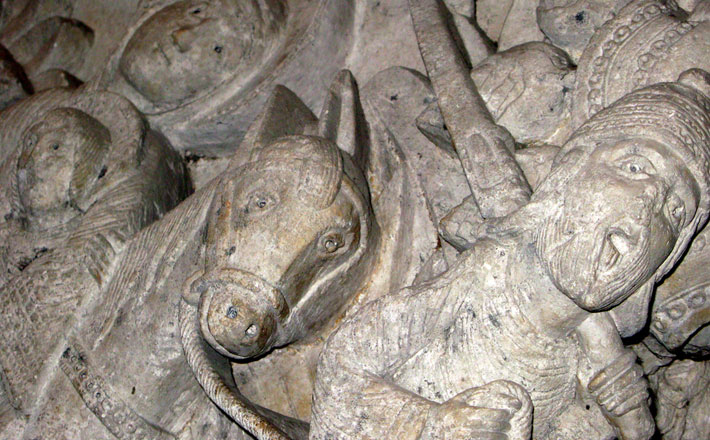Commentary on Psalm 124
The Psalms of December’s lectionary: three National Laments — and now, the Sunday after Christmas? A National Thanksgiving! How fitting.
Corporate prayers of confession, pleading for mercy for the people, issue in the dawning of salvation, and thus a National Thanksgiving. We might be able to picture a national prayer for help, much as we experienced in the day or two after 9/11 in 2001. But a National Thanksgiving? The only Thanksgiving we seem to know is … Thanksgiving, which — as Reinhold Niebuhr wisely suggested — is nothing but a day of national self-congratulation.
Psalm 124, in ancient Israel, was one of the “songs of ascents,” one of the Psalms sung on the steps leading up to the temple at the great festivals. But “ascent” isn’t the mood of the divine during these days. There should be “songs of descent,” for Advent/Christmas is about a God come down, a God flatly incapable of hovering aloof in some Olympian heaven, a God who cannot help but descend, coming down to be with us, to be among us, to be … us, Emmanuel, God with us. God as … us. “The Word became flesh and dwelt among us, full of grace and truth” (John 1:14).
The Psalm asks, “If the Lord had not been on our side … ” Does God really take sides? Some of the thinnest, most atrocious theology we overhear in our culture is about God being on the side of — well, of the white people, or the pious people, or the people of a certain religious inclination, or those who are straight, or think the Bible is literally true.
God can be on your side, and on the side also of your most implacable enemy. God not only can be; God is on your, and his side. How strange! And yet, God made both of us, God won’t settle for less than all of us, God is committed to the holiness and wholeness of me, and him, and her and them and those other guys.
Perhaps it makes good theological sense that a Psalm of Ascents happens on the Sunday we celebrate the God who descended. This is, paradoxically, God’s true ascent … coming down, subverting up from down. As Socrates argued in his conversation with Gorgias, “The life of us mortals must be turned upside down, and we are everywhere doing the opposite of what we ought.” Indeed. In this realm of God’s descent/ascent, up is down and down is up, humility is glory, royalty is subservience, nobility is peasantry, shepherds hear the angels sing, and the Scripture scholars miss the coming of Messiah, but petty astrologers find their way directly to the manger.
Psalm 124 imagines a bird escaping, wings flapping, perhaps with a screech. A bird should not be entrapped, and even a child knows it. Birds have wings, and were meant to fly free, to glorify God by having plumage and by taking to the air!
We need help. Anne Lamott quite rightly wrote about the three (and only three) moods of prayer: “Help, Thanks, Wow.” The first mood of prayer is the desperate, painfully obvious plea for help. Jesus’ own name is (in Hebrew) yeshua, “Lord help!” We cry out for the help we know we need and cannot find or secure for ourselves. The Lord is our help.
Psalm 124 winds down with an echo of Psalm 121, another “Psalm of Ascent,” and one we read often at funerals: “I lift up my eyes … from whom does my help come? My help comes from the Lord, who made heaven and earth.” Indeed. The help we need is right on the edge of life and death, not a little bit of help to make life fifteen percent better, but the help that is the difference between making it and not making it, the difference between life and death, the difference between faith and hope, and despair and isolation.
The God who is of considerable help is the one who made heaven and earth. Seriously: if God made all of this, the ground I walk on, the gravity that holds me in place, the breath I just took, the mountains, oceans, amoeba and eagles, this great God most clearly is able to help. This is the God who alone can help, and will, as is evidenced by what God has done over time, consistently, and most especially in the wonder of Christmas morning, taking on flesh, becoming one of us, what we all have been, mortal, human, vulnerable, lovely.
To contemplate what would have happened without this Lord is salutary. Were the Lord not on our side, the flood would have swept us away. Without the Lord we would have been “swallowed up alive.” We might feel swallowed up alive, but if we’re reading this, or preaching upon it, we haven’t been. God is good. We are still here, by the grace of God — and so we can take good hope in the God of Advent and Christmas, the God who ascended by coming down, and delivering real help to us, and to all God’s children in need.


December 28, 2014